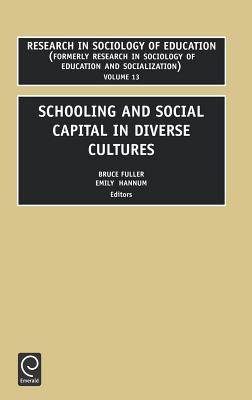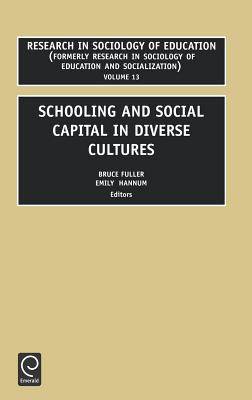
- Afhalen na 1 uur in een winkel met voorraad
- Gratis thuislevering in België vanaf € 30
- Ruim aanbod met 7 miljoen producten
- Afhalen na 1 uur in een winkel met voorraad
- Gratis thuislevering in België vanaf € 30
- Ruim aanbod met 7 miljoen producten
Schooling and Social Capital in Diverse Cultures
€ 289,95
+ 579 punten
Omschrijving
One of the most seductive topics in recent years is the field of social capital - the webs of trust, mutual obligation, and cultural knowledge that flow through local information - that yield resources in human-scale associations of individuals. When we ask about the implications for children's learning and performance in the school institution, however, the construct quickly becomes slippery to hold. The 2001 volume provides five papers that offer empirical evidence on the nature and life of social capital across diverse ethnic groups and cultural settings. These fresh studies delve into the resources embedded in Latino and Asian-American peer groups, how immigrant parents' networks and norms variably push their children to achieve in school, and how teenagers' involvement in ethnic-rooted churches contribute social capital. The volume includes three commentaries, authored by David Baker, Patricia Fernandez-Kelly, and Raymond Wong, and a review chapter by the editors.
Specificaties
Betrokkenen
- Uitgeverij:
Inhoud
- Aantal bladzijden:
- 196
- Taal:
- Engels
- Reeks:
- Reeksnummer:
- nr. 13
Eigenschappen
- Productcode (EAN):
- 9780762308170
- Verschijningsdatum:
- 18/04/2002
- Uitvoering:
- Hardcover
- Formaat:
- Genaaid
- Afmetingen:
- 156 mm x 234 mm
- Gewicht:
- 453 g

Alleen bij Standaard Boekhandel
+ 579 punten op je klantenkaart van Standaard Boekhandel
Beoordelingen
We publiceren alleen reviews die voldoen aan de voorwaarden voor reviews. Bekijk onze voorwaarden voor reviews.








